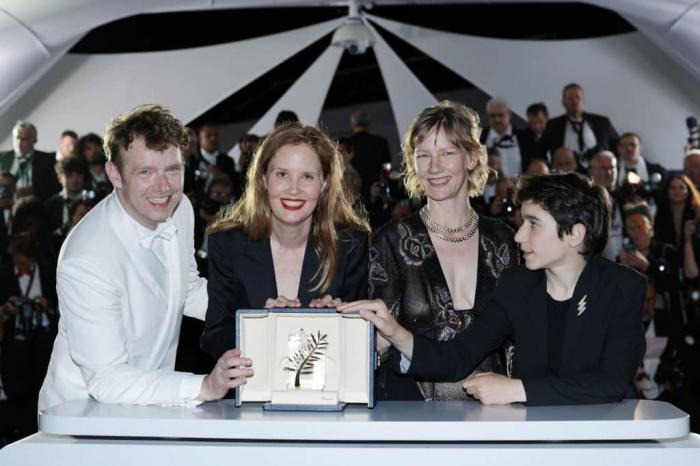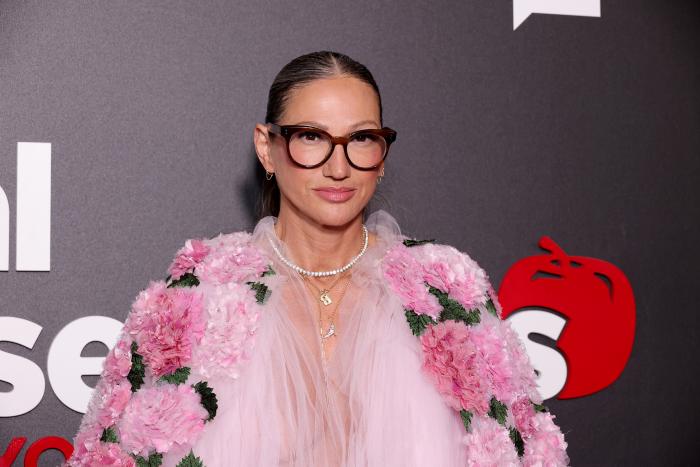

Let’s Give Justine Triet and ‘Anatomy of a Fall’ Their Flowers
By Kayleigh Donaldson | Film | January 26, 2024 |
By Kayleigh Donaldson | Film | January 26, 2024 |

For the past year, Justine Triet has been making history. She had already quickly established herself as a rising talent, having directed three feature films that were nominated for a slew of awards and played the worldwide festival circuit. In 2023, the writer-director became only the third female director to win the Palme d’Or for her courtroom drama Anatomy of a Fall. The film follows a woman who is put on trial for the murder of her husband after his body was found lying below the window of their chalet. During Triet’s acceptance speech, she declared her support for the pension reform protest movement and called out Emmanuel Macron’s ‘neo-liberal government’ for weakening France’s labor rights.
Même si Macron préfère Depardieu, le film de Justine Triet obtient 5 nominations aux Oscars.
— Marcel (@realmarcel1) January 23, 2024
Pour fêter ça on va réécouter son discours à Cannes. pic.twitter.com/mRH4hGUah0
For months, she faced intense pushback from her fellow countrymen, with Macron’s right-wing supporters claiming she and her politically-minded ‘auteur’ filmmaking colleagues were responsible for dwindling box office numbers. Variety reported several French film industry insiders as saying that Triet was ‘punished’ for these anti-Macron comments by the country’s Oscar committee when they flagrantly overlooked Anatomy of a Fall for their representation in the Best International Feature category. As the publication wrote, Triet is known as ‘an unfiltered and slightly eccentric intellectual’ who hasn’t been given the privilege of separating art from the artist that France is increasingly infamous for.
Despite all of this, the film became a box office hit in France, becoming only the seventh Palme d’Or winner to cross the 1 million admissions mark since 2000. It was ranked third on the Cahiers du Cinéma top ten list of 2023. Moreover, it broke out worldwide, and both Triet and her leading lady, German actress Sandra Hüller (also the star of The Zone of Interest), started being nominated for major American awards. This week, Anatomy of a Fall picked up five Oscar nominations, including ones for Best Picture, Best Actress, and Best Director. Triet is only the eighth woman to be nominated, and the first from France. Her own contemporaries doubted her, the old grey men of the French film world tried to punish her, and she came out on top.
Justine Triet and the Anatomy of a Fall team reacting to their 5 Oscar nominations, including best picture and director.pic.twitter.com/QloMclPv0f
— Ronaldo Trancoso Jr (@ronaldotrancoso) January 23, 2024
So, why does it feel like her achievement is being ignored, or actively undermined?
When Barbie did not land nominations in Best Actress or Best Director, despite having several others to its name and a billion-dollar gross, the responses were understandably full of disappointment. What did Greta Gerwig have to do to level up to the Academy’s staid standards? It seemed indicative not only of how women directors can’t win within this system but of the Oscars’ seeming allergy to blockbuster fare that prizes feminine aesthetics over grimdark realness. Many of the criticisms of Gerwig’s omission echoed the conversations we had about how Christopher Nolan got no respect for movies like The Dark Knight or even Steven Spielberg’s work in Jurassic Park being viewed as intrinsically less worthy of merit than his direction of Schindler’s List that same year.
We go through this most years, alas. The Academy is improving but its advancements are maddeningly incremental. It’s exhausting that we can only expect a maximum of one female director a year and even then that goal seems utterly out of reach for the voters when it should be a slam dunk. When you’re constantly told that the film ‘just isn’t the Oscars’ thing’ as an excuse for its omission, it’s all the more aggravating when one comes along that ticks all the boxes and it still can’t level up to the Academy’s standards. Gerwig certainly has nothing to prove in this regard, not with three films under her belt that all received Best Picture nominations, a first for any female filmmaker.
I get all of that, but it feels, at the very least, deeply misguided to entirely ignore Triet’s achievements (and that of other women in film of the past year) because Barbie didn’t get more than eight Oscar nominations. To see publications, social media, and Hillary gosh-darn Clinton push this false narrative that Barbie was uniformly shunned by the Academy and that doing so is a grand feminist crime is certainly a Choice. Reinforcing a rigid gender binary regarding a film that is largely about the pointlessness and cruelty of said binary is what it is. And what it has led to is a strange maligning of both Triet and Anatomy of a Fall, both as somehow anti-Barbie alternatives and works that aren’t as stridently feminist in intent.
Anatomy of a Fall is, at least in my opinion, an undeniably woman-driven and feminist-minded narrative. It’s the story of a woman put on trial, both legally and personally, who finds that her most mundane qualities as well as her innermost secrets are being used as evidence to damn her for something she may or may not have done. Sandra Hüller is excellent as the defendant, a writer whose life is picked apart by a prosecution that often seems more interested in her failings as a wife and mother than whether or not she killed a guy. Her gender is used as a weapon against her, as is her bisexuality, wielded by the smarmy prosecutor like a revelation of her intrinsic deceit. Qualities that seem perfectly normal are suddenly seen as malicious, calculated, even dangerous. Hüller’s intellect and cool demeanour are bitchy now, proof that she was constantly maligning her poor browbeaten husband. On top of that, she’s forced to speak in what is either her second or third language, making every communication a potential minefield. If you’ve ever watched a tatty true crime documentary where a suspect who dares to act ‘a bit weird’ is judged because of it, Triet’s dissection of the process will feel incredibly familiar.
What makes Anatomy of a Fall shine, despite its familiar set-up, is its refusal to give easy answers. You never discover if Hüller did it. That’s not the point. What matters more to Triet is how everything about your life is fair game to the rest of the world when things go wrong. Hüller must contend not only with lawyers, including her own one who clearly isn’t all that sure about her innocence, but with people she barely or doesn’t know. A woman who interviewed her on the day of the death is asked by the prosecutor to comment on Hüller’s mental state and whether or not she was flirtatious. Her late husband’s therapist asserts that he knew the real man more than his wife did, but Hüller insists he only saw the side of him her husband wanted to be seen. If that’s the case then surely that also applies to Hüller? And then there’s Daniel, her son (played by a phenomenal Milo Machado Graner) and perhaps the only person who can help her case. He’s partially blind due to a childhood accident and can’t fully attest to what he did or didn’t witness. Watching his own mother on trial clearly impacts his view of his family. How could it not?
Triet does so much with so little. The camera doesn’t move much. There’s no much music, aside from a hilariously intrusive playing of a calypso instrumental version of ‘P.I.M.P.’ by 50 Cent. There are no Hollywood courtroom theatrics or Sorkin-esque screaming matches. Yet, over the course of two and a half hours, you’re riveted. It’s a tightrope walk of technical and literary skill from Triet, one so deeply concerned about painfully human entanglements that it has no desire or need to embellish that which is already so fascinating about ourselves. It’s deceptively difficult to make a film like this, and Triet made it seem easy.
I hope Triet and her team are able to enjoy their successes as well as the champagne-heavy wildness of an Oscar campaign. While they may not take home Best Picture, there’s a solid chance that excellent screenplay could perform well with voters. Whatever the case, I think the film and this brilliant director are deserving of real love this season, and should be viewed as more than that other woman who made a film that wasn’t pink. Whatever arguments one might have with the Academy (and boy, we’ve been sharing our thoughts on them for years), let’s not perpetuate the idea that only one woman can succeed above all others. If nothing else, Barbie would find that idea ludicrous.
justine triet with her palme d'or and a cigarette pic.twitter.com/ZFjFDvKtBO
— lee (@firewIkwme) January 20, 2024
← Review: Get Ghosted By Steven Soderbergh's 'Presence' | 'The Boys' Star Erin Moriarty Shames Megyn Kelly for False Plastic Surgery Claims →
More Like This
How 'The Regime' and 'Palm Royale' Complicate Their Genres
How 'X-Men '97' Sidestepped Cyclops' Biggest Sin And Redeemed A Tragic Foe
Is 'Palm Royale' the New 'Desperate Housewives'? Not Even Close
The Body Politic: Why Are People Being So Weird About Sydney Sweeney’s Body?
You Haven't Lost Your Mind: The Ending of 'Constellation' Is Incoherent

Jenna Lyons Has Conditions For ‘Real Housewives’ Return
This Week On ‘Selling Sunset’: Irreconcilable Differences
Huey Lewis Was Inspired By 'Mamma Mia' For His Next 'Career Event'
Paramount+ Is Getting Cues From David Zaslav
Yorgos Lanthimos Reteams with Emma and Viggo Goes West In Three Trailers
Kristen Stewart Will Never Make an ‘Algorithmic’ Marvel Movie
More Like This
How 'The Regime' and 'Palm Royale' Complicate Their Genres
How 'X-Men '97' Sidestepped Cyclops' Biggest Sin And Redeemed A Tragic Foe
Is 'Palm Royale' the New 'Desperate Housewives'? Not Even Close
The Body Politic: Why Are People Being So Weird About Sydney Sweeney’s Body?
You Haven't Lost Your Mind: The Ending of 'Constellation' Is Incoherent
Reviews